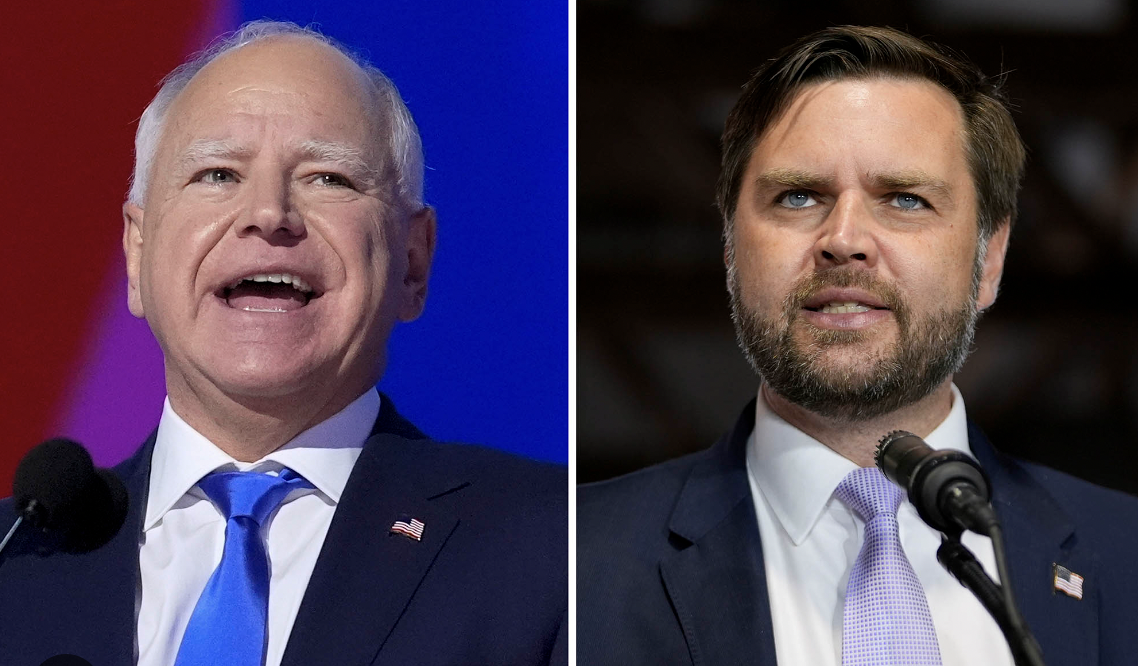Minnesota Gov. Tim Walz and Ohio Sen. J.D. Vance faced off on Tuesday, Oct. 1 in the first — and only — vice presidential debate this election cycle. The debate, hosted by CBS, comes in the midst of a historically tight presidential election between Vice President Kamala Harris and former President Donald Trump.
As with most televised political debates, the vice presidential debate is unlikely to have a significant impact on voting outcomes come election day. According to data compiled by Forbes, 43 million Americans tuned into the debate on TV — a 25% decrease in viewership from the last vice presidential debate in 2020.
The debate featured similar questions to those asked during Harris and Trump’s matchup on Sept. 10, including topics related to immigration, gun control and abortion.
A CBS snap poll conducted immediately after the debate reveals that neither Walz nor Vance decisively won — or lost — the debate, with 42% of respondents saying Vance won, 41% giving Walz the edge and 17% claiming it was a tie.
Here are a few LSU students’ takeaways from the debate:
Better than the First Debate
America hasn’t had a popular presidential candidate in a long time. Gallup, a popular pollster, explains that no presidential candidate since Mitt Romney in 2012 has posted more than a 50% approval rating. And Harris and Trump are no exceptions: Their approval ratings sit at 44% and 46%, respectively.
But while presidential candidates are struggling to earn the approval of American voters, Walz and Vance are enjoying surges in approval in the wake of Tuesday’s debate. On LSU’s campus, both Republicans and Democrats seem to approve of the other party’s vice presidential nominee more than they did before the debate.
“I thought J.D. Vance was going to be Trump part two,” said Brandon Reynolds, a communications doctoral student and registered Democrat. “But I was impressed by him last night. He looked like a traditional politician.”
Landon Terro, a sports administration junior and registered Republican, felt similarly about Walz. “I would much prefer Tim Walz to Kamala Harris. When I watched the debate, I thought; ‘Why can’t these two be running.’”
This trend is also reflected in national polling. CBS post-debate polling found that 88% of Americans viewed the debate positively, and Walz and Vance both experienced significant approval rating spikes, from 52% to 60% and 40 to 49%, respectively.
The Debate was Fair
During Harris and Trump’s debate on Sept. 10, moderators Linsey Davis and David Muir fact-checked Trump five times and Harris zero times.
While the statements Davis and Muir fact-checked were factually inaccurate, ABC’s decision to allow live fact-checks during the debate prompted criticism from Republicans that the debate was “rigged” in Harris’ favor.
For the vice presidential debate, CBS opted to eliminate live fact-checks in favor of allowing the candidates to fact-check each other. This procedural choice was aimed at preventing viewers from claiming that the results of the debate were manipulated by the media, thereby increasing its legitimacy.
And it seems it did. “I liked that the moderators didn’t try to cut either candidate off. They let them answer the questions,” Terro observed. “When the moderators fact-check the candidates, it makes them look biased. They should just let the candidates fact-check each other.”
Messages of Unity
It’s no secret that American politics is polarized. According to the Carnegie Endowment for International Peace, national politicians are increasingly disinterested in bipartisan cooperation, and Republican and Democratic voters are increasingly likely to express hostility toward members of the other party.
And Americans are tired of it: per the Pew Research Center, 65% of Americans say they always or often feel exhausted when thinking about politics.
The vice presidential debate seems to have been a breath of fresh air for American voters, with both Vance and Walz taking significantly softer rhetorical approaches than their running mates.
“I feel like Walz and Vance made a real effort to find commonality with each other,” Reynolds said. “When Tim Walz talked about his son witnessing a shooting, J.D. Vance told Walz how sorry he was. I wish our politics was always like this.”





